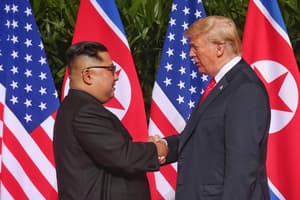Latest rally echoes past cycles where hopes of dialogue briefly lift 'unification-themed stocks' before geopolitical reality set in

As South Korea’s benchmark index, Kospi, hit a record high this week, another group of stocks saw a sudden rebound.
Breaking months of dormancy, shares tied to inter-Korean cooperation rallied sharply on renewed speculation that US President Donald Trump could hold talks with North Korean leader Kim Jong-un during his upcoming Asia tour, which could lead to a potential thaw between the two Koreas.
CNN reported on Oct. 18 that Trump administration officials have privately discussed a potential for Trump to meet Kim during his visit to Korea ahead of the Asia-Pacific Economic Cooperation summit in Gyeongju, North Gyeongsang Province, next week. However, the report noted that no serious planning for such a summit had yet taken place and that communication between Washington and Pyongyang remained far weaker than during Trump’s first term.
Despite skepticism over the likelihood of an actual meeting, investors appeared to sense renewed momentum for reconciliation and the resumption of economic cooperation between the two Koreas, which have been at a standstill since 2019. The prospect is bolstered now that South Korea has a president from the liberal bloc, which typically favors rapprochement with Pyongyang, and the US is led by Trump, who met North Korea’s Kim several times during his first term, though the talks ultimately fell apart.
On Monday, the first trading day after the news, shares of companies linked to inter-Korean projects, also known as “unification-themed stocks,” jumped sharply.
Shares of Ananti rose 6.63 percent on Monday from the previous session and continued the upward momentum the next day. The local luxury resort developer built a golf course and resort in the North’s Kumgangsan region in the 2000s.
Shares of Hyundai Elevator, the largest shareholder of Hyundai Asan, which owns the rights to the Kumkangsan tours, also rose 4.4 percent on Monday and continued the rally.
Other shares, including clothing manufacturers Shinwon, Codes Combine and GoodPeople, gained 6.79 percent, 14.9 percent and 12.12 percent, respectively. These firms had operated inside Kaesong Industrial Complex, a manufacturing hub in the border city jointly operated by the two Koreas. It was shut down in 2016 in response to the North’s nuclear test.
Construction and materials companies such as Ilshin Stone shot up 5.72 percent.
These unification-themed stocks have a history of swinging with the political mood on the Korean Peninsula: soaring on peace overtures or summit news and tumbling when tensions rise.
Reflecting this pattern, the stocks slipped later in the week on Wednesday and Thursday, after North Korea test-fired ballistic missiles into the East Sea on Wednesday. The country's first launches in five months escalated tension as Seoul prepares for the APEC summit, where Trump, Chinese President Xi Jinping and other world leaders are expected.
Analysts warn that these dramatic fluctuations highlight the speculative nature of unification-themed stock. Because they rely more on political developments than underlying business fundamentals, the shares experience sudden surges and rapid declines, making individual investors especially vulnerable.
“Stocks related to inter-Korean relations tend to move on speculation and political news, rather than real business performance, such as earnings, assets and operations," said a researcher at a local finance institute on condition of anonymity.
"Recent rallies on these themed stocks could be short-lived if there is no tangible diplomatic progress."
Rise and fall of unification stocks
The last time unification-themed shares experienced a rapid surge followed by a steep fall was in 2018 and 2019, when optimism about the US-North Korea summit lifted South Korean equities connected to cross-border collaboration.
The so-called unification rally took off in early 2018 after North Korea’s announcement to join the PyeongChang Winter Olympics. As diplomatic relations warmed, shares of construction, tourism and railway firms that are expected to benefit from projects such as the Kaesong Industrial Complex and infrastructure development in the North began to spike.
The rally accelerated in March when the first inter-Korean summit was confirmed, peaking around the April 27 meeting between President Moon Jae-in and North Korean leader Kim.
Seven inter-Korean cooperation stocks, including Haein, Ilsung Construction and Dongbu Construction, reached the maximum daily gain of 30 percent on April 23, 2018, four days before Moon and Kim held their first summit on the South’s side of the truce border village, Panmunjom.
At the Panmunjom summit, the two leaders pledged to reconnect the inter-Korean railways and modernize the North's roads, all seen as potential catalysts for South Korean companies to participate in the North's infrastructure projects.
These developments fueled an extended bull run through 2018 as the two leaders met two more times in May and September, and as Trump and Kim met in Singapore, which marked the first-ever meeting between the leaders of the two countries.
That optimism reversed sharply following the collapse of the second Trump-Kim summit in Hanoi in February 2019.
Inter-Korean cooperation stocks shed more than 10 percent in market value on the day the Hanoi summit ended without a deal, with 5.59 trillion won ($ 3.89 billion) wiped out, according to the Korea Exchange.
By late 2019, most inter-Korean cooperation shares had plummeted to less than half their peak values.

